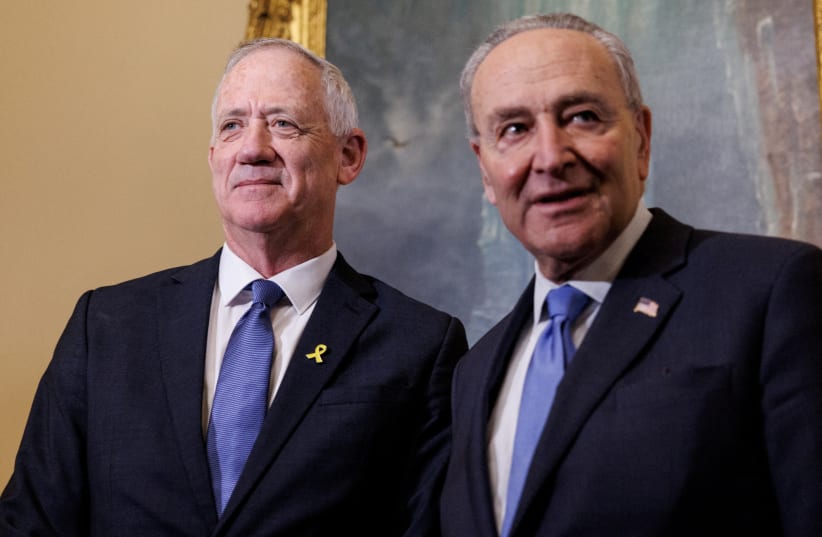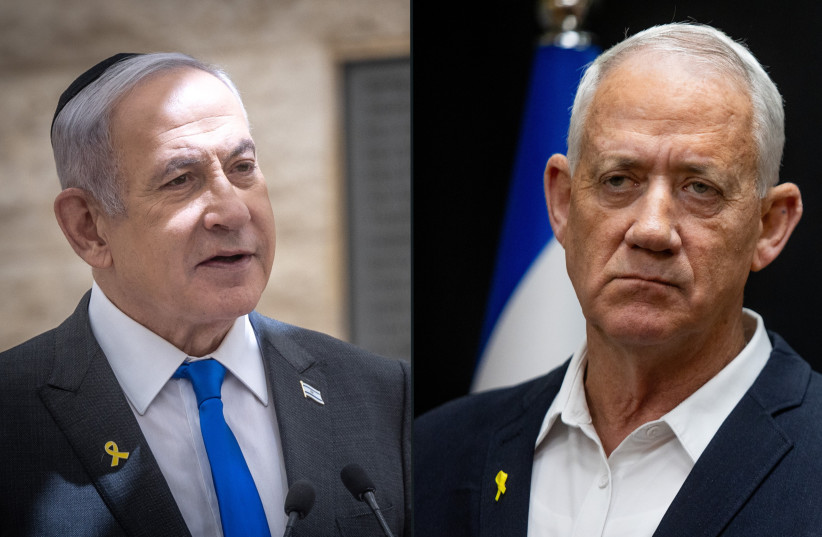It is time to put up or shut up, not only for Prime Minister Benjamin Netanyahu but for US President Joe Biden, as well. Within days of one another, Defense Minister Yoav Gallant and fellow war cabinet minister Benny Gantz have held news conferences, charging that Netanyahu isn’t showing leadership and arguing that he doesn’t have a plan for the future of the Gaza Strip.
In Washington, the US president and his team watched closely as Gallant and Gantz appeared before the media and the Israeli people, not to mention the international community. Back in March, both Israeli ministers were in the US, discussing war policy with Biden administration officials, even as the president said of Netanyahu, in an interview with MSNBC, that “in my view, he’s hurting Israel more than helping Israel.”
Just days later, Senate Majority Leader Charles Schumer, speaking on the Senate floor, called the prime minister “a major obstacle to peace,” adding that Netanyahu “has lost his way.” Schumer warned that if the current Israeli government coalition remained in power “after the war begins to wind down” and persisted in pursuing “dangerous and inflammatory policies that test existing US standards for assistance,” the US would “have no choice but to play a more active role in shaping Israeli policy by using our leverage to change the present course.”
If Schumer, a Democrat with close ties to Biden, was watching the Gallant and Gantz appearances this past week, he might have been comparing their comments with his own speech, during which he singled out National Security Minister Itamar Ben-Gvir and Finance Minister Bezalel Smotrich as two ministers who had to go. Smotrich also holds the position of minister in the Defense Ministry and has squared off over policy in the past with Gallant.
As opposed to Gallant, a member of Netanyahu’s Likud party, Gantz had been in the Knesset opposition but brought his own party into the government after the October 7 Hamas attacks, in order to grapple with the state of emergency. Last month, though, he said that an early parliamentary election should take place in September.
This past Saturday night, he handed Netanyahu an ultimatum: change course by June 8, or else the emergency coalition would be dismantled. The timing would be such that it could, in fact, lead to a Knesset ballot in September, as the process of preparing for an election has generally been viewed as taking three months.
How does Israel's internal politics impact its relations with the US
IN THE MEANTIME, as the status of Israel’s national emergency government hangs in the balance, what does it mean for the bilateral US-Israel effort aimed at finalizing how to navigate the Gaza war, and what is referred to as the “day after,” as well as containing the situation along the Lebanese border?
Netanyahu has acknowledged the support and cooperation that President Biden has provided during the war, and understands the pressures faced by the president as he pursues his own reelection bid ahead of the November US presidential election. Both in Jerusalem and Washington there is a feeling that “Netanyahu is simply stuck right now,” as a White House aide put it.
Until this point, the US administration has made public pronouncements questioning Israeli activity in Gaza but, for the most part, continued to work in tandem with the Israeli government. However, Rafah is “crunch time,” says the Biden aide.
“We are not trying to overthrow Netanyahu. We want to steer him to a moderate course in cooperation with his centrist ministers. Gantz and Gallant want what they want not because of the Biden administration’s desires,” the aide insisted. “They truly believe, on their own, that some of the more extreme moves proposed within the Israeli cabinet are bad for Israel. To suggest otherwise is insulting to these two men, who both have long military careers and care about their country.”
Either way, the cards have been put on the table to try to force Netanyahu into making a choice: does he prefer his further right-wing coalition members, or will he decide to work with Gallant, Gantz, and the Americans at the expense of the likes of Ben-Gvir and Smotrich?
But it is not only Netanyahu facing a choice. If the prime minister opts to prefer cooperation with Gallant and Gantz, how would this affect the US president’s pronouncements regarding Israeli policy? Until now, there has been the repetitive theme of “the Israeli cause is just; Netanyahu is the problem,” as a State Department official put it.
Would Biden and influential figures such as Senator Schumer issue new pronouncements that Washington can work with Jerusalem, that there is a path forward, that agreements can be reached between the two countries on how to end the war and to put a plan for the future in place? Will cooperation with Israel no longer be considered a liability for the Biden reelection bid?
In the meetings that Gantz and Gallant held with US officials, there were various disagreements. Still, the initial reactions from Washington to the statements made by the two war cabinet ministers about the future status of the Gaza Strip are “tentatively positive,” said the White House aide.
“We, of course, will have to hear more. Everything will be judged on a case-by-case basis,” he added. The Biden aide then suggested that instead of a headline that speaks of a “bilateral unity coalition,” it should be stated that the “US and Israel are close allies whose interests are the same and that cooperation needs to remain tight.”
The aide added: “We will be working with the Israeli political and military echelons to ensure a victory over Hamas, freeing the hostages, and dealing with the future of Gaza. The Israeli politicians will decide on their own as to when the country will conduct an election, and the Israeli people will decide on their own who they want as their leaders.”
The writer is the op-ed editor of The Jerusalem Post.

